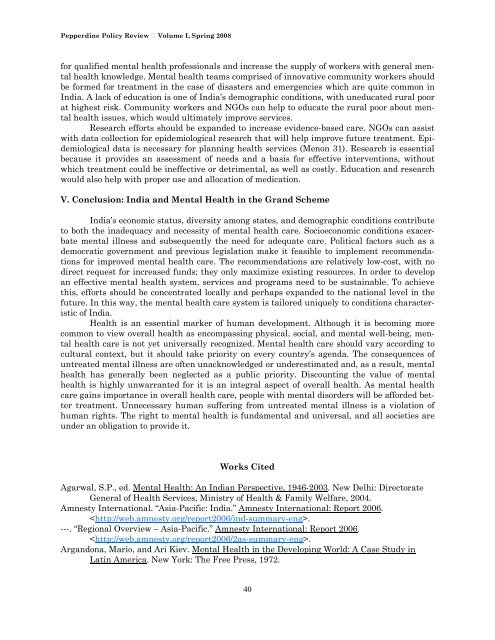Pepperdine University School of Public Policy
Pepperdine University School of Public Policy
Pepperdine University School of Public Policy
Create successful ePaper yourself
Turn your PDF publications into a flip-book with our unique Google optimized e-Paper software.
<strong>Pepperdine</strong> <strong>Policy</strong> Review Volume I, Spring 2008<br />
for qualified mental health pr<strong>of</strong>essionals and increase the supply <strong>of</strong> workers with general mental<br />
health knowledge. Mental health teams comprised <strong>of</strong> innovative community workers should<br />
be formed for treatment in the case <strong>of</strong> disasters and emergencies which are quite common in<br />
India. A lack <strong>of</strong> education is one <strong>of</strong> India’s demographic conditions, with uneducated rural poor<br />
at highest risk. Community workers and NGOs can help to educate the rural poor about mental<br />
health issues, which would ultimately improve services.<br />
Research efforts should be expanded to increase evidence-based care. NGOs can assist<br />
with data collection for epidemiological research that will help improve future treatment. Epidemiological<br />
data is necessary for planning health services (Menon 31). Research is essential<br />
because it provides an assessment <strong>of</strong> needs and a basis for effective interventions, without<br />
which treatment could be ineffective or detrimental, as well as costly. Education and research<br />
would also help with proper use and allocation <strong>of</strong> medication.<br />
V. Conclusion: India and Mental Health in the Grand Scheme<br />
India’s economic status, diversity among states, and demographic conditions contribute<br />
to both the inadequacy and necessity <strong>of</strong> mental health care. Socioeconomic conditions exacerbate<br />
mental illness and subsequently the need for adequate care. Political factors such as a<br />
democratic government and previous legislation make it feasible to implement recommendations<br />
for improved mental health care. The recommendations are relatively low-cost, with no<br />
direct request for increased funds; they only maximize existing resources. In order to develop<br />
an effective mental health system, services and programs need to be sustainable. To achieve<br />
this, efforts should be concentrated locally and perhaps expanded to the national level in the<br />
future. In this way, the mental health care system is tailored uniquely to conditions characteristic<br />
<strong>of</strong> India.<br />
Health is an essential marker <strong>of</strong> human development. Although it is becoming more<br />
common to view overall health as encompassing physical, social, and mental well-being, mental<br />
health care is not yet universally recognized. Mental health care should vary according to<br />
cultural context, but it should take priority on every country’s agenda. The consequences <strong>of</strong><br />
untreated mental illness are <strong>of</strong>ten unacknowledged or underestimated and, as a result, mental<br />
health has generally been neglected as a public priority. Discounting the value <strong>of</strong> mental<br />
health is highly unwarranted for it is an integral aspect <strong>of</strong> overall health. As mental health<br />
care gains importance in overall health care, people with mental disorders will be afforded better<br />
treatment. Unnecessary human suffering from untreated mental illness is a violation <strong>of</strong><br />
human rights. The right to mental health is fundamental and universal, and all societies are<br />
under an obligation to provide it.<br />
Works Cited<br />
Agarwal, S.P., ed. Mental Health: An Indian Perspective, 1946-2003. New Delhi: Directorate<br />
General <strong>of</strong> Health Services, Ministry <strong>of</strong> Health & Family Welfare, 2004.<br />
Amnesty International. “Asia-Pacific: India.” Amnesty International: Report 2006.<br />
.<br />
---. “Regional Overview – Asia-Pacific.” Amnesty International: Report 2006.<br />
.<br />
Argandona, Mario, and Ari Kiev. Mental Health in the Developing World: A Case Study in<br />
Latin America. New York: The Free Press, 1972.<br />
40












